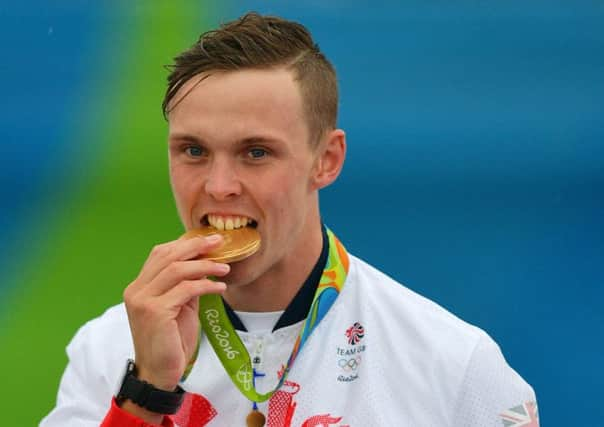Martyn McLaughlin: Team GB gold medals only cost £5.5m each


With five days to go before the curtain falls on the XXXI Olympiad, it may be premature to call time on the euphoria surrounding Team GB’s unprecedented success in Rio, but amid the slew of superlatives and quadrennial outburst of jingoism, what better time is there to ask what sustainable success looks like?
The answer may seem obvious considering the transformation in fortunes since the dark days of Atlanta 1996, when lowly Britain – the country of peely wally eccentrics and plucky underdogs – returned home with a solitary gold medal.
Advertisement
Hide AdAdvertisement
Hide AdIn the five Games since, the team has amassed a staggering 84 golds, with the hope of more to come before Sunday’s closing ceremony. We are a country with a proven culture of elite sporting excellence. That is cause for celebration.
But surely there is room for a hard-nosed analysis of how we got here and, more importantly, how our consistent victories might redefine our definition of success. The former question has a multitude of answers, not least the dedication and composure shown by athletes such as Max Whitlock. But even the double gold-winning gymnast would concede the springboard for his triumphs is a blunt instrument.
Ever since the UK’s World Class Performance Programme was rolled out in May 1997, the amount invested in medal hopefuls has risen dramatically. For the Sydney Games of 2000, UK Sport invested an unprecedented £58.9 million in the country’s hopes. Four years later, for Athens, that figure rose to £71m. Those sums become mere chicken feed compared to the investment for Beijing and London – some £235.1m and £264.1m respectively – an escalation in public expenditure scarcely seen in the postwar years.
Rio has continued the trend, with a record £274.4m ploughed into 20 key sports. The methodology employed by UK Sport, often referred to as the “no compromise” model, is carefully calibrated. In partnership with CGI, a Canadian IT firm, it utilises an array of data techniques and forecasting algorithms to gauge the best chances of medal wins. The system is technologically complex, but in layman’s terms its rationale is explicit: unless you can demonstrate consistent success or potential in your chosen field, the money dries up; just ask the British basketball team.
It is why the pot of money – three quarters of which comes from the National Lottery – has been funnelled into sports where Britain has proved its prowess. Nearly a third of the budget for Rio is swallowed up by just three sports – cycling, rowing and athletics – while the spend on canoeing and sailing has increased nearly fivefold over the past 16 years.
UK Sport is unapologetic for this blunt, snakes and ladders style approach, and understandably so. As its chief executive, Liz Nicholl, has pointed out, it is an investor looking for an outcome.
Yet even a crudely effective design has its limitations. The arguments against it are well-rehearsed; at a time when the public purse is squeezed, no feelgood factor can justify the £5.5m outlay required for each medal won in Rio.
The second rationale for change centres on the disproportionate focus on elite disciplines, which entrenches privilege and has a deleterious impact on those grassroots sports which receive little or no financial backing; if UK Sport has no faith in the emerging generation of weightlifters, basketball players or synchronised swimmers, what incentive is there for youngsters, particularly those from poorer backgrounds, to take them up?
Advertisement
Hide AdAdvertisement
Hide AdBut the crucial question has gone largely unasked over the past gilded decade – what is the endgame for Team GB and its backers?
The notion that top level Olympic success has benefits for the entire nation has been comprehensively debunked by separate research from the Scottish Household Survey and Sport England, which shows a decline in adults participating in sport over recent years. Considering these shores have recently hosted an Olympics and a Commonwealth Games, such damning statistics ought to shame those who trumpet spurious notions such as legacy.
Against all expectations, UK Sport was given a 29 per cent increase in funding in last autumn’s Spending Review, a sign, perhaps, of the soft power with which the UK Government associates podium places. It is a cycle that is both vicious and virtuous.
By the end of Tokyo 2020, a generation will have passed, ample time to cement Britain’s status as a global sporting force. Any move which puts that hard-won reputation at risk will be resisted, but if Team GB truly wants to take the next step in its golden journey, it must set out why we want to continue our winning streak.
Bridging the gap between elite sport and the grassroots is a Herculean task, one UK Sport believes to be the responsibility of governing bodies and the home country sports councils. It is no coincidence that on its website, the agency reminds visitors it has a “very clear remit at the ‘top end’ of Britain’s sporting pathway, with no direct involvement in community or schools sport”.
But with the profile of minority sports at an all -time high, innovative thinking could win commercial and philanthropic sponsorship and allow public money to be freed up for wider participatory schemes.
For all the glittering prizes accrued over the past 16 years, we deserve more from the £900m that has been spent to secure them. It is natural that we celebrate our triumphs in Rio, but it is vital that we also ask how we measure success.